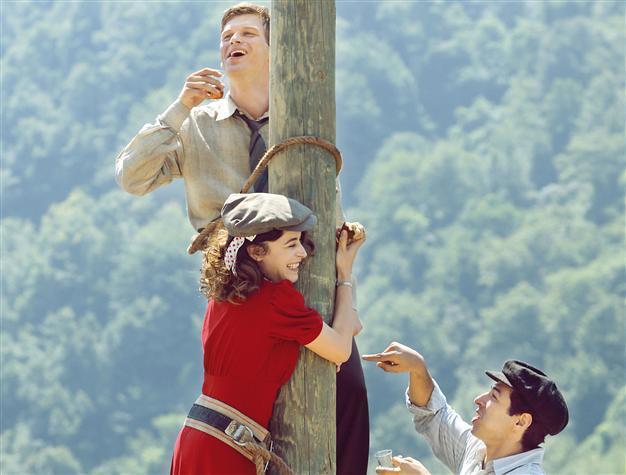'Butterfly's Dream' and ode to poets and poetry
EMRAH GÜLER ANKARA - Hürriyet Daily News

The film ‘Butterfly’s Dream’ takes place in a familiar region if you have been following recent Turkish cinema, northern Turkey, or the coast of the Black Sea.
What would your expectations from a good period drama be? That it takes you effortlessly back to a long-gone period with nuanced details, like “Argo?” That the whole idea is a grand scheme to make you aware that you are watching a recreation of an era, keeping you at a distance all the while you are watching, like “Lincoln?” Or that the period serves as a backdrop for a universal story, like “Anna Karenina?”Lush visuals and elaborate set designs are musts in a good period drama. So are costumes that are true to their period. While these might serve as a prerequisite for a good period drama, what truly sweeps me is the simultaneous feelings that how different things were then, and how little has changed since then. Also I hope to get a glimpse into the knowledge that history maybe is not linear and far away, but embedded in our very presence.
“Kelebeğin Rüyası” (The Butterfly’s Dream) has turned out to be one of those all-great period dramas for me. Filmmaker, writer, actor and – while unbeknownst to some – poet Yılmaz Erdoğan returns to the screen with a tale of poetry, youth and young love set in 1940s Turkey. Erdoğan writes, directs, and takes screen time with a supporting role as the revered poet Behçet Necatigil.
The film takes place in a familiar region if you have been following recent Turkish cinema, northern Turkey, or the coast of the Black Sea. The backdrop is the turmoil of the World War II, reflected through the Obligation Law, where every male in the city of Zonguldak and the surrounding towns is required to work in the coal mines.
In the center are two young struggling poets, Rüştü Onur and Muzaffer Tayyip Uslu, played respectively by Mert Fırat and TV heartthrob Kıvanç Tatlıtuğ, making his transition to screen actor. Although based on true life stories, Onur and Uslu are relatively lesser-known poets whose names will not ring any bell for many in the Turkish audience.
“Don’t write love poems,” wrote Austrian poet Rainer Maria Rilke in his “Letters to a Young Poet.” It is not a piece of advice these two young poets take to heart. On the contrary, writing love poems are at the heart of the film, the ultimate drive for the two men as they seek the love of the same girl with their poems.
Heart-breaking story
We see Onur and Uslu having bonded together over their shared passion, writing poems. Their dream is to see their poems published on the pages of the prestigious literary magazine, Varlık. And their mentor is their teacher, a poet more ingrained in Turkey’s collective conscience, Necatigil. “You need three things to write poetry,” Necatigil tells the two young men, “An idea, a typewriter, and paper.” There might be no problem on the idea front, but sometimes even the other two are hard to come by. The struggles of poets everywhere and every period in history take them as their passion is dismissed, frowned upon, or taken lightheartedly. The problems of the two poets shift as a muse in the form of a female high school student enters their lives. The daughter of a rich businessman, Suzan (Belçim Bilgin) transforms them as poets, as young men fuelled with hormones and as friends. The two decide on a gentlemen’s and artists’ duel to set who is going to step away: Writing the poem Suzan will like the most.
With its heart-breaking narratives on young love, poetry and desperation against the system, and tuberculosis (the cancer of an era) replacing drugs, “Kelebeğin Rüyası” is a tale much reminiscent of Jack Kerouac’s ode to the 1940s, “On the Road.” Sal, Dean and Marylou are replaced here by their kindred spirits on the other side of the world. This is a film about poetry. And it’s a top-notch collaborative effort in making the film a true ode to poetry. Kudos are due to Gökhan Tiryaki’s cinematography, Rahman Altın’s score, Hakan Yarkın’s art direction and Gülümser Gürtunca’s costume design. But the greatest applause goes to Erdoğan, who showcases some of his skills at his best: as a director, as a writer, but most of all, as a poet.
















